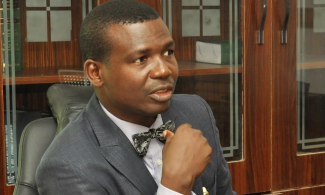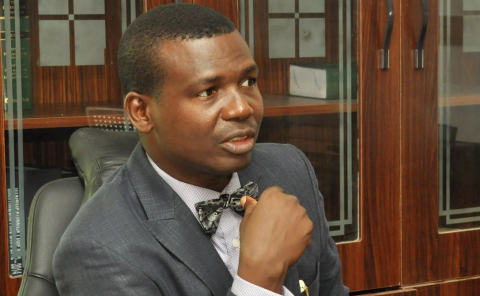
Let us for once then feel what others feel, concerning the justice system in Nigeria, wherein litigants die before justice could reach them or they get judgment devoid of justice, at the end of the day.
Two weeks ago, I was a guest speaker at the Annual Law Week of the Nigerian Bar Association, Ibadan Branch. I had the privilege of speaking on the important topic of Justice as the bedrock of an enduring democracy. Different people have different concepts of justice, depending always, on the circumstances and indeed the setting. But the universal idea of doing right to all manner of people, the concept of equity and fairness, to give to one what is due to him and not to deny people their rights, give the broad outline of what justice should be, at least to all mankind. Let me share the contents of my lecture with you.
INTRODUCTION:
The theme of this presentation could not have come at a better time than now, when our nation seems to be gasping for breath, in the area of justice delivery. Nigeria has ‘experimented’ with uninterrupted democracy for well over 20 years, since the return to democratic rule on May 29, 1999. Therefore the term ‘democracy’, is familiar to most Nigerians, especially my esteemed learned audience, with whom I now share my thoughts through this paper. I cannot however vouch with due respect that most Nigerians, especially the ruling elite, fully understand the meaning and modus operandi of democracy.
MEANING OF DEMOCRACY
From the simplistic but articulate definition of Abraham Lincoln of democracy as “the government of the people, by the people and for the people” to James Roland Pennock, who in his book ‘Democratic Theory’ defined democracy as “Government by the people, where liberty, equality and fraternity are secured to the greatest possible degree and in which human capacities are developed to the utmost, by means including free and full discussion of common problems and interests”, a common trend that runs through the concept of democracy, is that democracy is a form of government, that places the people at the centre and in which decisions by elected representatives, must reflect the wishes of the majority of the citizens.
In essence, democracy is a system of government that operates within the rules of law, that respect the rights of citizens to dissent with government without fear of harassment and where the fundamental rights of citizens are guaranteed and protected by the State. In my introduction above, I deliberately avoided the use of the term ‘practice’ in relation to democracy in Nigeria and in modesty, opted for the word “experimented’ for some obvious reasons. Nigeria cannot in fairness ascribe itself with the toga of democracy, simply because the President or Governors are not putting on camouflage. It cannot also lay claim to democracy on the basis that every four years elections which cannot meet the test of democracy, are conducted by INEC (the electoral umpire) in most parts of the country, while in the local government elections, the party which controls the State governments must of necessity win all the local councils in that State. The kind of democracy being experimented in Nigeria can as well pass as civil rule and no more.

The shape of Nigerian democracy is well captured by the columnist Israel Ejike, in his article titled “Nigeria’s definition of Democracy” published in Thisday newspaper of October 14, 2018 thus:
“Nigeria’s democracy can be defined as a system of government where a group of political business men and women specialized in using tokens and beautiful promises to promote ambition of selected business managers to preside over affairs of the country or state government. These individuals execute their game of deception by hiring thugs specially recommended for rigging, wrangling the electorate in elections. Security operatives in this system of government become observers in the rigging process. The rich cabal after declaring themselves or stooges winners, sit back and feast on the commonwealth of the people. If the people dare protest bad governance, they will be treated as criminals.”
He goes further in his description thus:
From the sombre definition of democratic practice above, it is valid to include; non-payment of salaries for civil servants as a norm, only personal projects of those elected get completed, public projects exist on paper or abandoned. Voices of dissent are crushed, the constitution is mostly jettisoned. A true picture of Nigeria’s specially tailored democratic practice is overseen by the ruling cabals – a group of special deities who once ruled Nigeria under the military or civilians who once participated in pro democratic protests under military rule. These special power blocs choose a preferred candidate, who could be one of them or a mentee often known as “anointed candidate”. After their choice is debriefed, the cabals identify with a political party of choice and the rest is history.
Can anyone fault Ejike’s definition of the ‘Nigerian Democracy” when he further describes it thus?
“The system is looted dry before they leave, when they do, they handover to a political son to continue the process of looting all over again. Our home grown democracy is not without supporters. These supporters could be anybody but the interesting group, are educated individuals who have conscripted themselves to certified hypocrites, sycophants or blackmailers. Some are paid, others just join the bandwagon. The country can burn for all they care. These platoons of goons are specialists in making bad leaders look good. They are always ready to sell alternative views anywhere policies of their liege draw flaks from right thinking people. They are the fuel that keeps empty, inept leaders' locomotive train running.”
Without prejudice to the view canvassed above, my usage of the word ‘experiment’ on the other hand is an indication of hope. Hope in the potential of the Nigerian State to develop a full democratic system in the governance of our Country. This hope is built on the fact that the practice of democracy is a journey. A journey which the American activist Michael puts thus: “Democracy is not a spectator’s sport. It’s a participatory event. If we don’t participate, it ceases to be democracy.”
THE CONCEPT OF JUSTICE
At this juncture, I invite you to join us as we interrogate the concept of justice. What is justice, if I may ask? What was it that prophet Amos meant when he said “let justice roll like water and righteousness like streams of living water? (Amos 5:24). At the outset, it would seem that it is a very simple concept to define, however when placed in the context of different societies, circumstances and personal idiosyncrasies, one cannot but continue to ponder on what justice really means.
This same debacle of definition was faced by early philosophers and writers. For instance,Plato sees justice as “a virtue establishing rational order, with each part performing its appropriate role and not interfering with the proper functioning of other parts.” For Aristotle, justice “consists in what is lawful and fair, with fairness involving equitable distributions and the correction of what is inequitable.” Kant defines justice as “a virtue whereby we respect others’ freedom, autonomy, and dignity by not interfering with their voluntary actions, so long as those do not violate others’ rights.” Mill sees justice as a collective name for the most important social utilities, which are conducive to fostering and protecting human liberty.
From the various definitions and perceptions highlighted above, it would be correct to assert that the true perception of justice is dependent on the circumstance, location, orientation and beliefs of those who clamour for it. In summary, justice is giving each one in the society what is due to him. I do hope that we can say this of the present situation of Nigeria, at least going by the ‘visitations’ to the temples of justice during the EndSARS protests. The image of the young man adorning the wig and gown, with a big machete in his hands, right inside the court premises, gives us the idea of his expectation for instant justice; one in which cases will be decided promptly and without the usual delays.
Though very unpalatable watching the desecration of the temple of justice by those who need it most, some hard lessons must have been passed to us the stakeholders, namely that society is dissatisfied with the kind of justice system that we have bequeathed to them from the colonialists, which is purely elitist and unable to cater to the needs of the masses of our people. Let us for once then feel what others feel, concerning the justice system in Nigeria, wherein litigants die before justice could reach them or they get judgment devoid of justice, at the end of the day.
The challenge then is to find what needs to be done, to guarantee justice to our people, if we all agree that it is the bedrock of democracy. And it has to be so, because the alternative to justice cannot be imagined at all. The rule of might has never endured in any sane society, as arbitrariness, impunity and lawlessness will take over and the idea of democracy will only then be a mirage, said to be alien to Africa, whereas in the early days of our forefathers, the indigenous democratic system worked well for them in all ramifications. The challenge is to blend our model with those of the other regions.